
Negeri Sembilan, historically spelled as Negri Sembilan, is a state in Malaysia which lies on the western coast of Peninsular Malaysia. It borders Selangor on the north, Pahang in the east, and Malacca and Johor to the south.
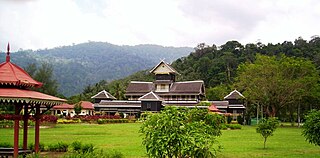
Seri Menanti is a town, a mukim, and a state assembly constituency in Kuala Pilah District, central Negeri Sembilan, Malaysia, located 33 km east of the state capital city of Seremban and 14 km southwest of Kuala Pilah. It is the royal capital of the state of Negeri Sembilan and houses the seat of the ruler of the state of Negeri Sembilan, referred to as the Yang Di-Pertuan Besar of Negeri Sembilan or Yamtuan Besar. The royal palace is known as Istana Besar.
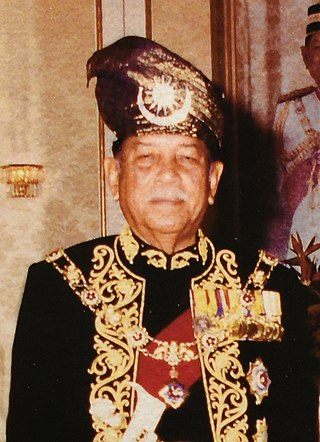
Tuanku Ja’afar ibni Almarhum Tuanku Abdul Rahman was Yang Di-Pertuan Besar of Negeri Sembilan from 1967 until his death in 2008, and the tenth Yang di-Pertuan Agong, from 1994 to 1999.
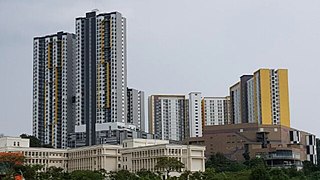
Nilai is a city located in Seremban District, Negeri Sembilan, Malaysia, located close to the border with Selangor. It is the northern suburb within the Seremban metropolitan area, as well as part of the Greater Kuala Lumpur metropolitan area.

Tampin is a town in Tampin District, Negeri Sembilan, Malaysia, which borders Pulau Sebang town in Alor Gajah District, Malacca. It is situated at the southern tip of the longest mountain range in Malaysia, the Titiwangsa Mountains.
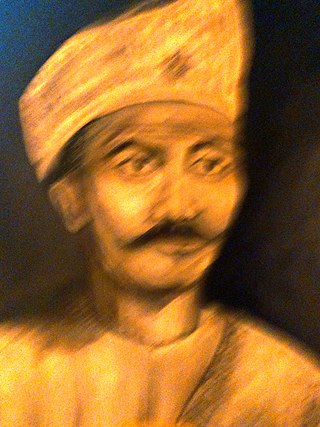
Raja Mahmud ibni Almarhum Sultan Abdul Jalil, known as Raja Melewar, was the first Yamtuan Besar of Negeri Sembilan, Malaysia. He was a prince from the Pagaruyung Kingdom in Sumatra, now situated within Indonesia.

The Jempol District is the largest district in the Malaysian state of Negeri Sembilan. The district borders Jelebu District to the northwest, Kuala Pilah District to the west, Tampin District to the south, Bera District, Pahang to the northeast and Segamat District, Johor to the east. Bandar Seri Jempol and Bahau are the principal towns in Jempol.

Johol is a town, a mukim and a state assembly constituency in Kuala Pilah District, Negeri Sembilan, Malaysia. It is roughly halfway between Tampin and Kuala Pilah, along FT 9.

The Yamtuan Besar, also known officially as Yang di-Pertuan Besar and unofficially as Grand Ruler, is the royal title of the ruler of the Malaysian state of Negeri Sembilan. The Grand Ruler of Negeri Sembilan is elected by a council of ruling chiefs in the state, or the Undangs. This royal practice has been followed since 1773. The Yamtuan Besar is elected from among the four leading princes of Negeri Sembilan ; the Undangs themselves cannot stand for election and their choice of a ruler is limited to a male Muslim who is Malay and also a "lawfully begotten descendant of Raja Radin ibni Raja Lenggang", the 4th Yamtuan.

Tuanku Sir Muhammad Shah ibni Almarhum Tuanku Antah was the seventh Yamtuan Besar of Seri Menanti, and ruled from 1888 to 1933. During his reign, Negeri Sembilan came under British protection in 1889 and became a Federated Malay State in 1895.
The flag and the coat of arms of Negeri Sembilan are state symbols of Negeri Sembilan, Malaysia. The symbols are predominantly depicted in red, black and yellow, traditional colours of the Minangkabau people who are the original settlers in the present-day state. Also recognised in the symbols are the political history of Negeri Sembilan, its ruler, and the state's past relationship with the British Empire.

The Linggi River is a river in Malaysia which flows through the states of Negeri Sembilan and Malacca. It is one of two major rivers that serve as water sources for most of Negeri Sembilan's population, the other being the Muar River, which constitutes the state's eastern half.
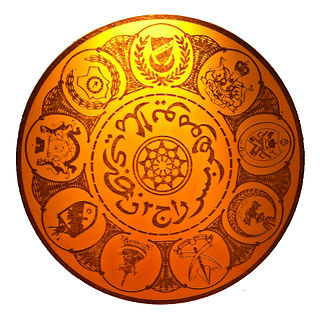
The monarchies of Malaysia exist in each of the nine Malay states under the constitutional monarchy system as practised in Malaysia. The political system of Malaysia is based on the Westminster parliamentary system in combination with features of a federation.
Mohammad Jan bin Abdul Ghani, Dato' Johan Pahlawan Lela Perkasa Setiawan, was the 14th Undang of Luak Johol, one of the traditional states of Negeri Sembilan in Malaysia.

Penghulu is the headman or chief of a region in traditional societies in the Malay Archipelago. The term is currently used in Brunei and Malaysia as the community leader of the smaller country subdivision or settlement.
Negeri Sembilan Malay is an Austronesian language spoken mainly in the Malaysian state of Negeri Sembilan, including parts of Hulu Langat District in southeastern Selangor, Alor Gajah and parts of Jasin District in northern Malacca, and parts of Segamat District in the northernmost part of Johor. The language is spoken by the descendants of Minangkabau settlers from Sumatra, who have migrated to Negeri Sembilan since as early as the 14th century. It is often considered a variant or dialect of the Minangkabau language; lexical and phonological studies, however, indicate that it is more closely related to Standard Malay than it is to Minangkabau.
Tuanku Antah ibni Almarhum Yamtuan Radin was the sixth Yamtuan Besar of Negeri Sembilan. He ruled from 1874 to 1888 and was known for trying to keep Negeri Sembilan free from British intervention. His son Tuanku Muhammad Shah succeeded him and modernised the state.

The Rembau District is a district that is located in the state of Negeri Sembilan, Malaysia. The district is a stronghold of the matrilineal system known as adat perpatih, a customary practice inherited from the Minangkabaus, of Sumatra. The district borders Seremban District to the north, Port Dickson District to the west, Tampin District to the east, Kuala Pilah District to the northeast and Alor Gajah District, Malacca to the southwest.
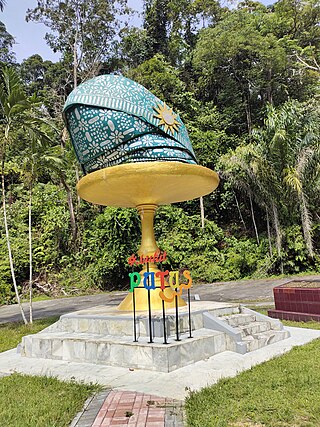
Bukit Putus is a mountain pass situated on the boundary between Seremban dan Kuala Pilah Districts in the Malaysian state of Negeri Sembilan, sandwiched between the Telapak Buruk-Berembun massif and Mount Angsi of the Negri Titiwangsa. The mountain pass connects the Seremban suburb of Paroi in the west with Ulu Bendul in the east. It is one of the three principal passes that link western and eastern Negeri Sembilan, the other two being Bukit Tangga (Seremban–Jelebu) and Bukit Miku.















